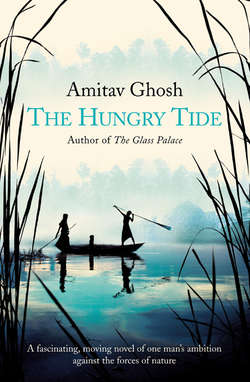Читать книгу The Hungry Tide - Amitav Ghosh - Страница 16
Fokir
ОглавлениеOnly after the launch had disappeared from view was Piya able to breathe freely again. But now, as her muscles loosened, the delayed shock she had been half-expecting set in as well. Her limbs began to quiver and all of a sudden her chin was knocking a drumbeat on her kneecaps; in a moment she was shivering hard enough to shake the boat, sending ripples across the water.
There was a touch on her shoulder and she turned sideways to see the child, standing beside her. He put his arm around her and clung to her back, hugging her, trying to warm her body with his own. She closed her eyes and did not open them again until the chattering of her teeth had stopped.
Now it was the fisherman who was in front of her, squatting on his haunches and looking into her face with an inquiring frown. Slowly, as her shivering passed, his face relaxed into a smile. With a finger on his chest, pointing at himself, he said, ‘Fokir.’ She understood that this was his name and responded with her own: ‘Piya.’ With a nod of acknowledgement, he turned to the boy and said, ‘Tutul.’ Then his forefinger moved, from himself to the boy and back again, and she knew he was telling her the boy was his son.
‘Tutul.’
Looking closely at the child she saw he was even younger than she had thought, perhaps no more than five years old. He was wearing a threadbare sweater, against the November chill. Below this hung a pair of huge, discoloured shorts that looked as though they had once belonged to a school uniform. He had something in his hands, and when he held it up she saw it was her laminated placard. She had no idea where he had found it but was pleased to see it again. He brought it to her, holding it in front of him like a tray, and gave her fingers a squeeze, as though to assure her of his protection.
The gesture had the paradoxical effect of making her aware of her own vulnerability. This was not a feeling she was accustomed to – she was used to being on her own in out-of-the-way places, with only strangers for company. But her experience with the guard had bruised her confidence and she felt as though she were recovering from an assault. This made her all the more grateful for the child’s presence: she knew that if it weren’t for him it would have been much harder for her to put her trust in a complete stranger as she had done. It was true, then, that in a way the boy was her protector. The recognition of this made her do something that did not come easily. She was not given to displays of affection but now, in a brief gesture of gratitude, she opened her arms and gave the boy a hug.
As she released the child, she noticed he was looking intently at her hands – her wallet was still wedged between her fingers. With a guilty start, she remembered that she had made no mention of money to the fisherman. Opening the wallet, she took out a wad of Indian currency and separated a thin sheaf of notes from the rest. She was counting out the money when she became aware of their attention and looked up. They appeared to be transfixed and their eyes were following her fingers as though she were performing some intricate feat of jugglery. There was a wonderment in their faces that told her that their absorption was not a function of greed; it was just that they had never before been in the proximity of so large a sum of money and so many crisp currency notes. Yet, despite the closeness of this scrutiny, Fokir seemed not to have understood that it was for him that she was counting the money: when she offered the notes to him, he recoiled guiltily, as though she’d offered him some kind of contraband.
The sum she had counted out was small, no more than she might elsewhere have paid for a few sandwiches and a couple of coffees. Her research grant was too tight to allow her to be lavish, but this small token, at least, she felt she did owe him, and if he had had a shirt she would have tucked the money right into his pocket. As it happened, apart from his wet loincloth he was wearing nothing but a small cylindrical medallion tied to his arm with a string, just above the bicep. Unable to think of any other expedient, she twisted the notes into a roll and thrust them under the medallion. His skin, she noticed, was bristling with goosebumps and she could not tell whether this was a reaction to her touch or to the chilly evening wind.
A loud exclamation followed as Fokir retrieved the money. When the notes were in his hands, he examined them as if in disbelief, holding them at a distance from his face. Presently, with a gesture in the direction of the recently departed launch, he peeled a single note from the bundle and held it aloft. She understood that he was telling her that he would accept that one note as compensation for the money that had been taken from him. He handed this to the boy, who darted off to hide it somewhere in the thatch of the boat’s hood.
The other notes he gave back to her, and when she attempted to protest, he pointed towards the horizon and repeated the word she herself had uttered earlier: ‘Lusibari.’ She recognized he was deferring the matter of payment until they arrived at Lusibari, and there she was content to let the matter rest.
